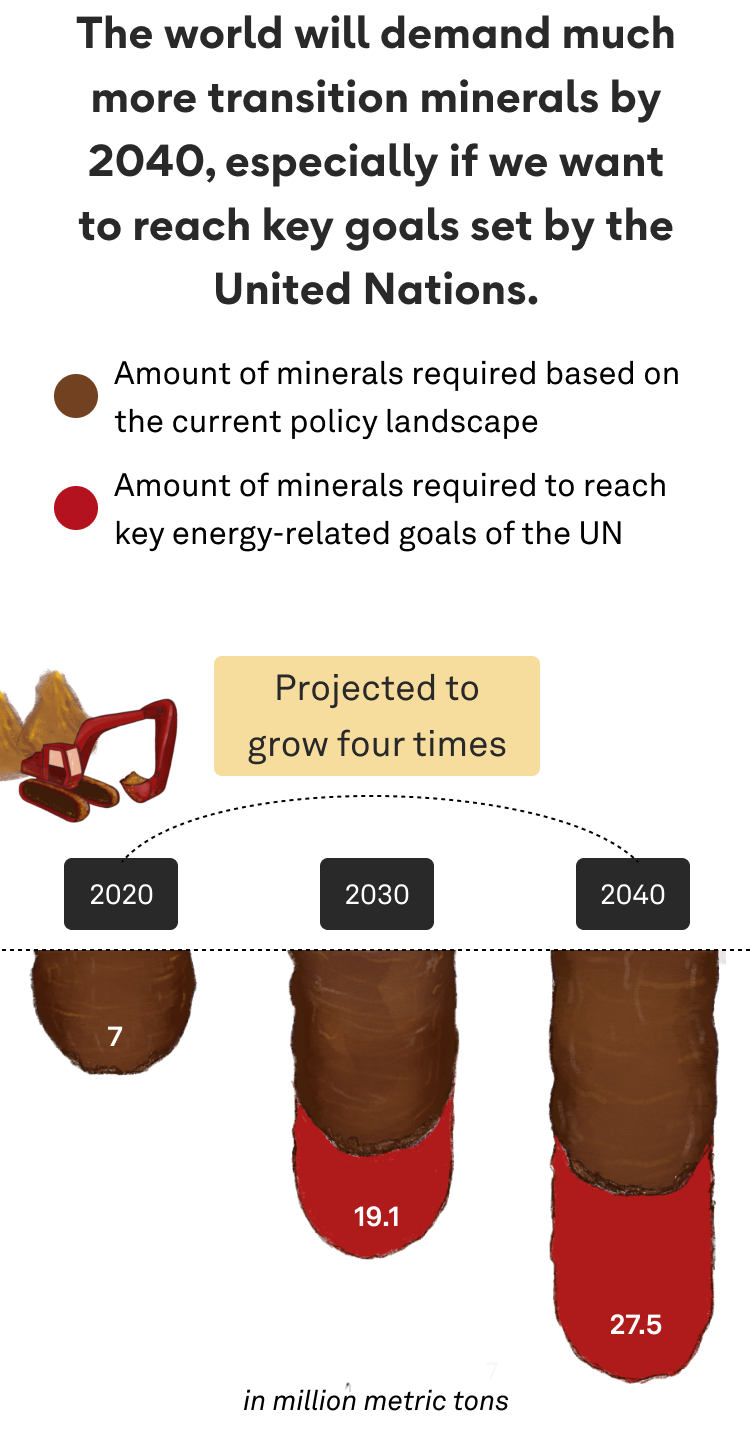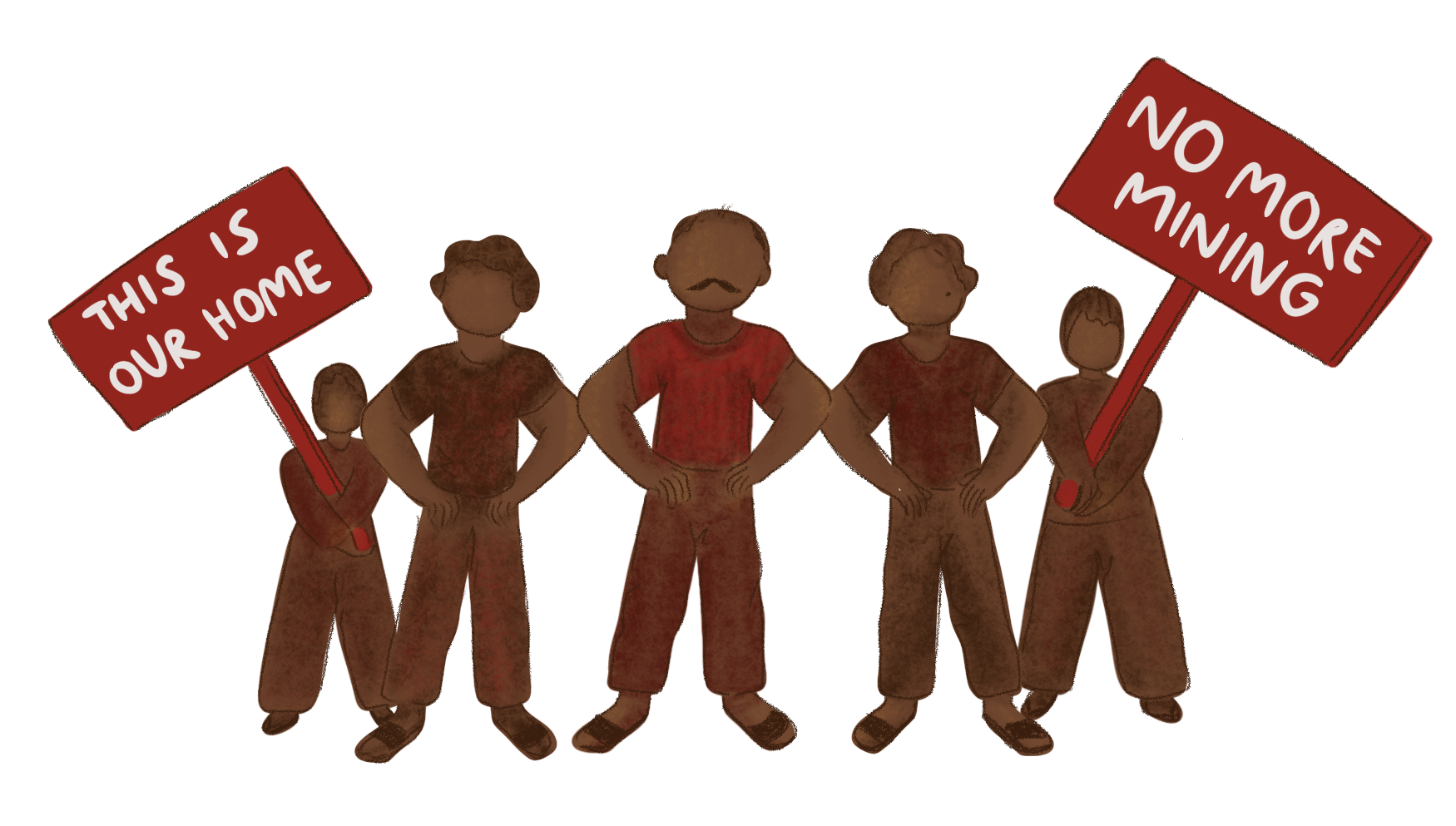The Curse of Abundance
The cost of mining Asia's transition minerals to power the global energy transition
by Gwyneth ChengTo prevent environmental collapse, the world needs to transition to renewable sources of energy and consume less natural resources overall. This transition takes a disproportionately huge toll on many countries in Asia, who barely enjoy the benefits of renewable energy.
Fossil fuels continue to be the main source of power generation globally. They make up 80 percent of human energy consumption while emitting an enormous amount of greenhouse gas emissions (GHGs), a major contributor to rapid global warming since the Industrial Revolution.
To reduce our reliance on fossil fuels, countries have turned to sustainable sources such as solar, wind power, and hydropower in recent years. Thankfully, we’ve seen some success here—renewable sources generated more than 30 percent of the world’s electricity in 2024.
However, this shift to more sustainable sources of energy, while seemingly positive, has not been equitable. At present, there is an imbalance between communities who can access and benefit from renewable energy, electric vehicles (EVs), and other environmental technologies, and those who cannot. This divide is most obvious between higher-income, heavily consumptive economies and lower-income nations with fast-developing mining industries, many of which are in Asia.
To reduce our reliance on fossil fuels, countries have turned to sustainable sources such as solar, wind power, and hydropower in recent years. Thankfully, we’ve seen some success here—renewable sources generated more than 30 percent of the world’s electricity in 2024.
However, this shift to more sustainable sources of energy, while seemingly positive, has not been equitable. At present, there is an imbalance between communities who can access and benefit from renewable energy, electric vehicles (EVs), and other environmental technologies, and those who cannot. This divide is most obvious between higher-income, heavily consumptive economies and lower-income nations with fast-developing mining industries, many of which are in Asia.
The abundance of raw minerals in Asia
To transition to more sustainable energy sources, new infrastructures and technologies are needed, including solar panels, wind turbines, rechargeable batteries, and EVs. All of these require minerals to create, which is why they’re called “transition minerals”.
There are many transition minerals, but the key ones are lithium, graphite, cobalt, nickel, and manganese, which are necessary for lithium-ion batteries. Lithium-ion batteries are an essential part of renewables, as they are often used for energy storage and are a necessity in EVs.
There are many transition minerals, but the key ones are lithium, graphite, cobalt, nickel, and manganese, which are necessary for lithium-ion batteries. Lithium-ion batteries are an essential part of renewables, as they are often used for energy storage and are a necessity in EVs.
In order to keep global warming below 2°C, the least ambitious scenario under the Paris Agreement, the current demand for transition minerals is predicted to increase by four times by 2040.

Source: Mineral Requirements for Clean Energy Transitions. The Role of Critical Minerals in Clean Energy Transitions. International Energy Agency, 2021. (Link)
Large reserves of these minerals are found in Asia. Specifically, when it comes to cobalt and nickel, Southeast Asian countries stand out.
Indonesia is the largest nickel producer in the world by a long shot, producing about 4.5 times more than the second largest, the Philippines. In 2023, it produced 1.8 million metric tons of nickel, five times more than it produced in 2017. Vietnam, with a rapidly growing mining sector over the past decade, is the second-largest global producer of tungsten.
Because of Asia’s abundance of transition minerals, the continent is heavily mined as the world pivots towards renewables. However, renewable energy use in the region still remains relatively less common overall compared to the rest of the world.
Because of Asia’s abundance of transition minerals, the continent is heavily mined as the world pivots towards renewables. However, renewable energy use in the region still remains relatively less common overall compared to the rest of the world.
The price Asia pays for its resources
Mining isn’t new to the region, so countries do have long-established mining codes in place. However, these activities have been tied to reports of human rights violations and instances of environmental devastation, as stakeholders regularly take advantage of lax law enforcement, cheap labour, and sometimes corruption among the powerful. This all results in the lack of strict compliance with mining codes and best practices, leading to unmitigated environmental devastation and prolonged human injustice along the transition minerals supply chain.
Throughout the years, many representatives from local communities, Indigenous Peoples, and environmental, land, and human rights groups who have protested and fought against the impacts of transition minerals mining have faced intimidation, threats, and attacks. Some have been murdered.
In Asia, 16 activists were reportedly murdered in 2022 alone, with 11 cases occurring in the Philippines. Globally, more than a third of activists who lost their lives defending their land and environment were Indigenous Peoples, and more than one-fifth were farmers who fought for the resources they needed to survive.
This silencing of voices and the fear it incites further adds to the difficulty of holding large mining companies and their investors accountable.
In Asia, 16 activists were reportedly murdered in 2022 alone, with 11 cases occurring in the Philippines. Globally, more than a third of activists who lost their lives defending their land and environment were Indigenous Peoples, and more than one-fifth were farmers who fought for the resources they needed to survive.
This silencing of voices and the fear it incites further adds to the difficulty of holding large mining companies and their investors accountable.
A just transition is already possible
While it is imperative to rapidly shift from fossil fuels to renewables, it is equally important for this transition to be “just”. This means ensuring that the benefits of a more sustainable lifestyle and economy are equitably shared across the world, while mitigating its impacts especially on marginalised communities.
It is not an unreasonable goal—a sustainable transition to renewables is already possible with the current technologies and policies that need to be enforced.
There are already established international standards that governments, mining companies, private sector actors, financial institutions, and other stakeholders can leverage to ensure that their policies and practices uphold the rights and well-being of local communities and the environment.
It is not an unreasonable goal—a sustainable transition to renewables is already possible with the current technologies and policies that need to be enforced.
There are already established international standards that governments, mining companies, private sector actors, financial institutions, and other stakeholders can leverage to ensure that their policies and practices uphold the rights and well-being of local communities and the environment.
Other mitigative measures involve recycling, which is not new to the mining industry. Many metals already have long established recycling processes, but it is still uncommon for most transition minerals.
The supply chain can definitely become more circular with current technologies—this means re-using, refurbishing, recycling, and recovering materials that have been produced and later discarded, to reduce the need to mine new minerals in large quantities.
Solutions are already available, but many of them are not mandatory, legally enforceable, or economically feasible. For the mining industry to become more circular and aligned with international standards, stakeholders need to comply willingly.
The supply chain can definitely become more circular with current technologies—this means re-using, refurbishing, recycling, and recovering materials that have been produced and later discarded, to reduce the need to mine new minerals in large quantities.
Solutions are already available, but many of them are not mandatory, legally enforceable, or economically feasible. For the mining industry to become more circular and aligned with international standards, stakeholders need to comply willingly.
Power of the People
Despite attempts to silence them, many affected communities continue to push back and hold mining companies accountable.
In Loeha, South Sulawesi, farmers have formed a movement that continues to fight against the expansion of mining activities in the region. Together with several local and international civil society organisations, they established a delegation and spoke up about farmers’ rights at their local Ministry of Environment and Forestry, as well as several embassies in Jakarta in October 2023.
Environmental activists have also been working tirelessly to defend human and environmental rights. Friends of the Earth International (FoEI) is a global network of grassroots organisations across 73 countries. In 2018, the Asia Pacific FoE organisations called out the Indonesian and Filipino governments to stop criminalising human rights defenders. In 2025, FoE Japan petitioned to stop nickel mining and processing in Palawan.
In Loeha, South Sulawesi, farmers have formed a movement that continues to fight against the expansion of mining activities in the region. Together with several local and international civil society organisations, they established a delegation and spoke up about farmers’ rights at their local Ministry of Environment and Forestry, as well as several embassies in Jakarta in October 2023.
Environmental activists have also been working tirelessly to defend human and environmental rights. Friends of the Earth International (FoEI) is a global network of grassroots organisations across 73 countries. In 2018, the Asia Pacific FoE organisations called out the Indonesian and Filipino governments to stop criminalising human rights defenders. In 2025, FoE Japan petitioned to stop nickel mining and processing in Palawan.

Using power for good
As smaller stakeholders tirelessly fight for their rights, the spotlight remains on the ones in power, who have much greater flexibility and ability for change.
The transition minerals supply chain in Asia follows where the money flows—mining companies and facilities heavily rely on monetary investment from institutions and banks. This means it is imperative that investors put their money into companies that aim to comply with the best possible environmental, social, and governance (ESG) standards.
In recent times, Asia’s transition minerals supply chain has become more integrated. Mining companies are merging, entering joint ventures, and signing agreements with processing facilities, manufacturers, and end product companies. This means that manufacturers and end product companies have more influence over mining and processing operations, and—if they choose to be responsible actors—can become more involved in upholding regulations and standards, as well as preventing and mitigating risks.
Sadly, these expectations are still far from reality, according to Fair Finance Asia’s (FFA) mapping of indirect supply chain links between Asian banks, global EV manufacturers, and nickel mines in Indonesia and the Philippines.
FFA has been steadily advocating for a just energy transition (JET) in Asia, and the role financial institutions play in the process. To urge Asia's financial institutions to accelerate and advance JET, they have published nine principles, which include the push for longer term planning and the need to respect and value land and human rights as we shift to renewables.
The transition minerals supply chain in Asia follows where the money flows—mining companies and facilities heavily rely on monetary investment from institutions and banks. This means it is imperative that investors put their money into companies that aim to comply with the best possible environmental, social, and governance (ESG) standards.
In recent times, Asia’s transition minerals supply chain has become more integrated. Mining companies are merging, entering joint ventures, and signing agreements with processing facilities, manufacturers, and end product companies. This means that manufacturers and end product companies have more influence over mining and processing operations, and—if they choose to be responsible actors—can become more involved in upholding regulations and standards, as well as preventing and mitigating risks.
Sadly, these expectations are still far from reality, according to Fair Finance Asia’s (FFA) mapping of indirect supply chain links between Asian banks, global EV manufacturers, and nickel mines in Indonesia and the Philippines.
FFA has been steadily advocating for a just energy transition (JET) in Asia, and the role financial institutions play in the process. To urge Asia's financial institutions to accelerate and advance JET, they have published nine principles, which include the push for longer term planning and the need to respect and value land and human rights as we shift to renewables.
Governments still fall short
Governments of higher-income nations have attempted to address the imbalance of access and benefits in the transition to renewables.
In 2022, the Minerals Security Partnership came into place, consisting of 14 countries and the European Union. The participating countries represent more than half of the global gross domestic product (GDP), and their goal is to encourage responsible investment into mining, processing, and recycling of transition minerals.
More recently, on 24 May 2024, a Directive on corporate sustainability due diligence was approved for implementation by the Council of the European Union. This Directive encourages businesses to adopt sustainable and transparent operations, and makes it compulsory for large corporations to submit and implement a plan for a just transition towards renewables and other climate change mitigation strategies. However, recent analysis has revealed that many financial institutions are exempt from due diligence under this directive.
There’s still way more that governments can do, which is what organisations, researchers, and activists have been speaking up about in a combined Manifesto for an Ecosocial Energy Transition from the Peoples of the Global South, released in early 2023. The manifesto demands that high-income countries who rely on the exploitation of resource-intensive nations for energy transition must repay back what they owe to the latter. They further urge nations of the south to reject exploitative alliances, and instead pursue strategic coordination with higher-income nations to ensure an equitable transition.
In 2022, the Minerals Security Partnership came into place, consisting of 14 countries and the European Union. The participating countries represent more than half of the global gross domestic product (GDP), and their goal is to encourage responsible investment into mining, processing, and recycling of transition minerals.
More recently, on 24 May 2024, a Directive on corporate sustainability due diligence was approved for implementation by the Council of the European Union. This Directive encourages businesses to adopt sustainable and transparent operations, and makes it compulsory for large corporations to submit and implement a plan for a just transition towards renewables and other climate change mitigation strategies. However, recent analysis has revealed that many financial institutions are exempt from due diligence under this directive.
There’s still way more that governments can do, which is what organisations, researchers, and activists have been speaking up about in a combined Manifesto for an Ecosocial Energy Transition from the Peoples of the Global South, released in early 2023. The manifesto demands that high-income countries who rely on the exploitation of resource-intensive nations for energy transition must repay back what they owe to the latter. They further urge nations of the south to reject exploitative alliances, and instead pursue strategic coordination with higher-income nations to ensure an equitable transition.
“In the context of climate change, [...] the capitalist centres have stepped up the pressure to extract natural wealth and rely on cheap labour from the countries on the periphery. [...] This decarbonisation of the rich [...] depends on a new phase of environmental despoliation of the Global South, which affects the lives of millions of women, men, and children, not to mention non-human life.”
— Manifesto for an Ecosocial Energy Transition from the Peoples of the South
Where is Asia headed next?
The increasing demand for Asia's transition minerals is happening in parallel with increased investments in Asia's production of EVs and batteries.
Thailand, the largest car producer in Southeast Asia, has intentions to manufacture EVs. Malaysia, Indonesia, and Vietnam are aiming to kickstart local EV and battery-making industries. Asian countries that do not have strong mining industries, such as Japan and South Korea, are also participating by creating a circular economy, for a more sustainable global shift into clean energy.
Thailand, the largest car producer in Southeast Asia, has intentions to manufacture EVs. Malaysia, Indonesia, and Vietnam are aiming to kickstart local EV and battery-making industries. Asian countries that do not have strong mining industries, such as Japan and South Korea, are also participating by creating a circular economy, for a more sustainable global shift into clean energy.
Hold CTRL or ⌘ to zoom the map
Our role in the transition to renewables
In June 2025, pre-Conference of the Parties (COP) discussions at the Bonn Climate Change Conference (SB 62) resulted in a draft guideline that would help countries adopt a more sustainable transition into clean energy. This draft is planned to be further concretised at COP30 in November 2025.
While the draft guidelines represent a positive step forward, they mark only the start of discussions to include just transition priorities.
Governments and financial institutions should do more to develop and enforce due diligence policies aligned with the highest international standards to prevent and mitigate harms to human rights and the environment.
As for ourselves, we can stay updated about what moving to renewables means for us, our neighbouring countries, and communities all over the world. We can actively ask for greater transparency from the financial institutions and banks that we use, and demand they take up more responsible business practices across the whole supply chain. We can write to and vote for electoral representatives who ensure that our country makes accountable decisions as we go green.
A just energy transition requires cooperation from all nations, not just the will of a few. Moving towards renewables isn’t a single-country, hand-waving economic impulse—it should be done sustainably and benefit all regions without one gaining at the expense of another.
The global transition to renewables must involve and respect communities, as well as take a more environmentally sensitive approach. A more sustainable future must be achieved responsibly. To do so, all countries must care about, support, and strive towards climate justice.
This story includes data and insights from Fair Finance Asia's 2024 report, Unearthing The Hidden Costs: Social and Environmental Considerations in Asia’s Transition Minerals Mining and Supply Chains. Fair Finance Asia is a network of over 90 Asian civil society organisations committed to ensuring that the funding decisions of financial institutions operating in the region respect the social and environmental rights and well-being of local communities.
While the draft guidelines represent a positive step forward, they mark only the start of discussions to include just transition priorities.
Governments and financial institutions should do more to develop and enforce due diligence policies aligned with the highest international standards to prevent and mitigate harms to human rights and the environment.
As for ourselves, we can stay updated about what moving to renewables means for us, our neighbouring countries, and communities all over the world. We can actively ask for greater transparency from the financial institutions and banks that we use, and demand they take up more responsible business practices across the whole supply chain. We can write to and vote for electoral representatives who ensure that our country makes accountable decisions as we go green.
A just energy transition requires cooperation from all nations, not just the will of a few. Moving towards renewables isn’t a single-country, hand-waving economic impulse—it should be done sustainably and benefit all regions without one gaining at the expense of another.
The global transition to renewables must involve and respect communities, as well as take a more environmentally sensitive approach. A more sustainable future must be achieved responsibly. To do so, all countries must care about, support, and strive towards climate justice.
This story includes data and insights from Fair Finance Asia's 2024 report, Unearthing The Hidden Costs: Social and Environmental Considerations in Asia’s Transition Minerals Mining and Supply Chains. Fair Finance Asia is a network of over 90 Asian civil society organisations committed to ensuring that the funding decisions of financial institutions operating in the region respect the social and environmental rights and well-being of local communities.
Disclaimer: Our stories have been researched and fact-checked to the best of our abilities. Should you spot
mistakes, inaccuracies, or have queries about our sources, please drop us an e-mail at
hello@kontinentalist.com
Credits
Code / Siti Aishah
Design and Illustrations / Amanda Teo
Editing / Nabilah Said, Loh Pei Ying, Zafirah Zein
Recommended Stories








